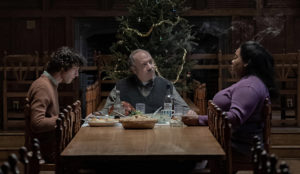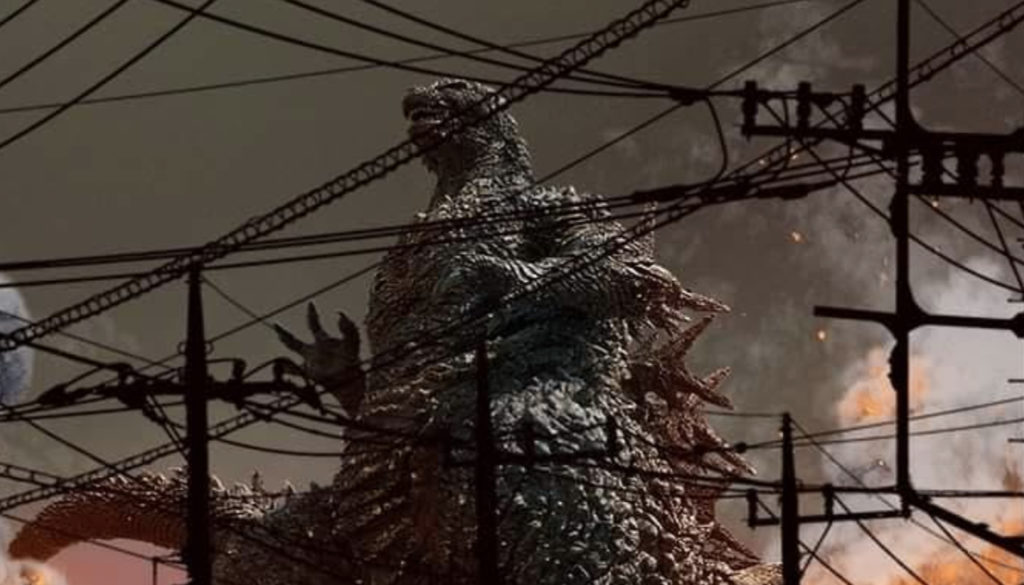One of the minor delights of living in Los Angeles is the quality of its billboards.
Advertisements back home blight the night sky with offers to buy my apparently ugly house, or cheat me out of a DUI in whatever language it takes. LA has those too, but in recompense it also gives us the “For Your Consideration” billboards, bus signs, and the occasional sky banner telling who or what to vote for in whatever award show we’re not a member of.
I, for one, feel marginally less of an outsider when the giant eyes of Paul Giamatti loom over me, like a benevolent Dr. T.J. Eckleburg in “The Great Gatsby.”
Those billboards harken the arrival of Oscar season, which will culminate with the ceremony next weekend. Since there are so many movies, but only so many times I can bother my dear editor with emails, this is my last chance to share some nominees I admired but couldn’t devote entire whole reviews to.
‘The Holdovers’
Is there really such a thing as the five stages of grieving? Does grief have a nature, or is it just something that filters through the nature of the person? These are the questions asked at Barton Academy, a New England boarding school in Alexander Payne’s nominated film.
It’s Christmas 1970, and everyone else has gone home save three stragglers: Angus Tully (Dominic Sessa), a student staying over the break, Paul Hunham (Paul Giamatti), a history teacher assigned to watch him, and Mary Lamb (Da’Vine Joy Randolph), a cafeteria worker who stays behind to feed both.

All three have no one to go home to, but react to that absence differently. Angus is young and still has the energy — and hope — to lash out at his circumstances. Paul, an atheist and a stoic, pretends to be above his anger while letting it corrode him from the inside. Mary buries herself in her work, a fine plan until you inevitably run out of work.
“The Holdovers” doesn’t offer a solution to their pain – if it did, the pharmaceutical companies would never let the movie be released. But the characters must discover, as we all do, a truism so annoying in its simplicity that it must be right: whatever the way out, you can’t do it alone. It’s said misery loves company, but “The Holdovers” argues that the miserable need it more than they want it.
‘American Fiction’
If identity politics is a war, then Monk Ellison is a conscientious objector. Cord Jefferson’s strong directorial debut follows Monk (Jeffery Wright), a Black literary professor and novelist irritated at the limits imposed on him by even the most well-meaning of white people. The opening scene is a thesis statement of his frustrations where a white student in his class refuses to discuss Flannery O’Connor and lectures him on the severity of the n-word, as if she were the aggrieved party.
Publishers aren’t interested in his books, because while he is a Black author, he has the audacity to write on subjects besides the Black experience. At his wit’s end, he writes a novel satirizing what the publishers’ want, with gangs and drugs and broken vernacular, far from his own experience. Of course, the publishers love it and offer an advance payment too tempting to turn down, putting Monk in a hole where the only way out is to dig deeper.

I saw this film as God intended, with an audience of fellow Caucasians too scared to laugh at half the jokes and laughing too much at the ones they felt invited into. But “American Fiction” is so effective as a satire because it spares no one, Monk included. He is a deeply human hero, which is just a printable way of implying how much of a jerk he is. Like many who presume themselves geniuses, he stopped recognizing the distinction between principle and ego long ago.
His final predicament mirrors the age-old debate between faith and good works: Does what you hold in your heart matter nearly as much as what you put into the world?
‘Godzilla Minus One’
This was not nominated for “Best Picture” but rather “Best Visual Effects.” Perhaps it’s cheating to include it here, but I wanted to discuss it and there’s no authority you can report me to.
The highest grossing Japanese language film in American box office history, “Godzilla Minus One” takes the series back to its post-World War II Japan roots. Koichi (Ryunosuke Kamiki) is a kamikaze pilot who bails from his final assignment, averting his plane instead to a nearby island base. Before he can be reprimanded, Godzilla attacks the base and scatters the forces. Koichi has the chance once to fire his plane’s guns at the monster, but his will fails again and Godzilla escapes.
Returning to a bombed-out Tokyo, Koichi wrestles with these twin failures and the unspoken judgment from others who see cowardice in his survival. Fate draws him into the lives of a young woman named Noriko (Minami Hamabe) and her adopted daughter, but shame keeps him from opening himself to love. That is, till Godzilla returns and a chance for redemption is in play.
Godzilla movies are often a reptilian spectacle with some human scenes you patiently tolerate, but the human drama proves almost as compelling as the skyscraper lizard with atomic breath. Your own breath is held as you wonder if Koichi can learn to stop trying to justify his own existence and let others love him. This finishes with a rousing third act that praises the collective while not losing sight of the individuals that comprise it, and also points out that sacrifice can only come from those who value life first.
Will any of these films win their Oscar? Not unless Christopher Nolan gets nailed with racketeering charges. But we, Paul Giamatti, Flannery O’Connor, and Godzilla can always hope.

